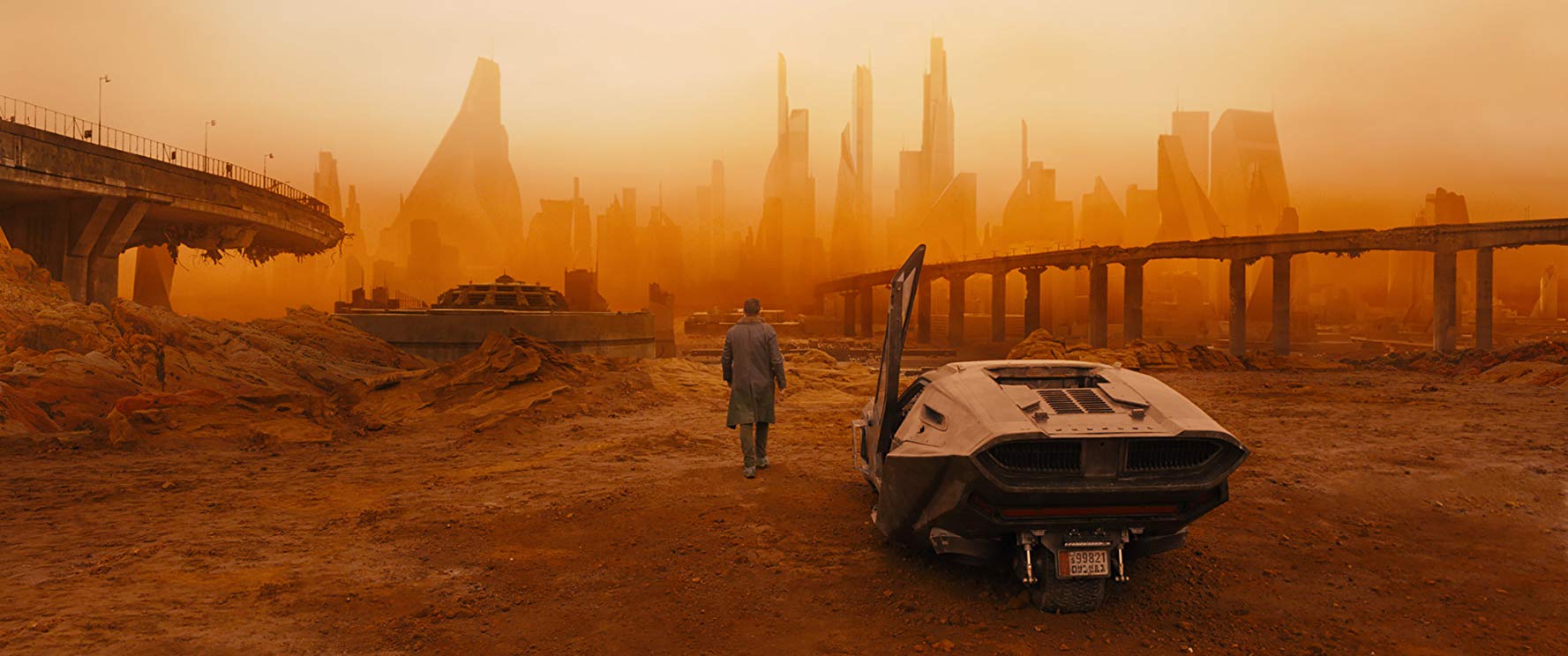
While not household names like Quentin Tarantino and Steven Spielberg, there are three industry leaders that have been revitalizing the world of cinema for the last five years. It’s more than just conjecture to say that their careers are just beginning, and that warrants a brief discussion about their works. In this director spotlight, we will explore the fascinating and varied careers of Yorgos Lanthimos, Alex Garland, and Denis Villeneuve.
Yorgos Lanthimos
Yorgos Lanthimos is a 46-year-old Greek filmmaker, known for his bleak style and dark sense of humor. Until 2015, Lanthimos focused on Greek film, and he became a darling of the film festival circuit. He even garnered a Best Foreign Language Film Oscar nomination for his strange 2009 production, Dogtooth. But it wasn’t until his first English language film, The Lobster, that he caught the eye of American audiences.
The Lobster
The Lobster is a dark and whimsical deconstruction of traditional family values. Colin Farrell stars as David, a shy, single man, desperate to find true love. He lives in a world with harsh, unforgiving rules regarding relationships. Men and women are not permitted to be single. Instead, they must admit themselves into the care of the Hotel. At the Hotel, guests are given 45 days to establish a stable, monogamous relationship, or be turned into an animal and set loose in the forest.
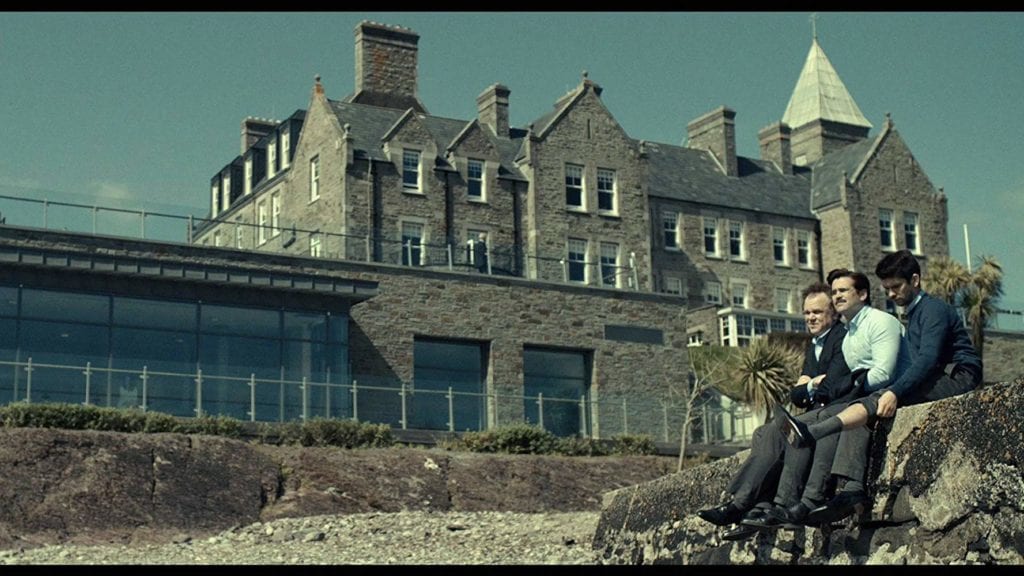
The Lobster is not for everyone. Some will find its odd tone and the monotone delivery of the dialogue distracting. But others might find comfort in the ridiculousness with which the film portrays societal expectations. The Lobster effortlessly spotlights the insanity of these seemingly arbitrary social constructs, dreamily sliding from one strange sequence to the next with uncanny emotional accuracy. It encourages the audience to ask themselves, “Why do we, as a society, treat romantic relationships like a series of achievements instead of genuine and unique human connections?”
The Favourite
Lanthimos’ 2018 film The Favourite is a masterpiece of modern cinema. The screenplay (by Deborah Davis and Tony McNamara) is a fascinatingly complex tale of intrigue and sex, with sharp and subtle dialogue on par with Shakespeare. The camerawork complements it perfectly, expertly juggling breathtaking wide shots and long takes of intimate close-ups.
Most revolutionary is the use of a 6mm fisheye lens, which gives the film a tinge of irony, as if the camera is winking at the falseness of these “grand” moments in history. It’s clear that Lanthimos and his cinematographer, Robbie Ryan, weren’t interested in making a traditional period film. The Favourite looks more like Through the Looking Glass than Elizabeth.
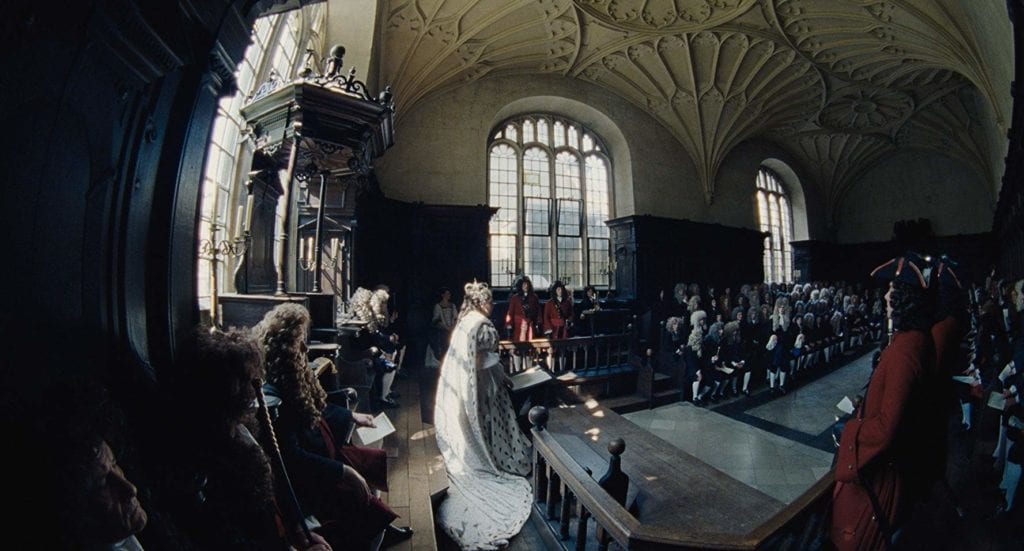
Rachel Weisz and Emma Stone both give incredible performances, but this film belongs to Olivia Colman, whose performance won her the Oscar for Best Performance in a Leading Role. She steals every single scene with her sensitive and provocative portrayal of one of Britain’s least glamorous monarchs, Queen Anne. The Favourite is fresh, bold, and transgressive. If Game of Thrones was the fantasy show for people who don’t like fantasy, then The Favourite is the historical costume drama for people who don’t like historical costume dramas.
Pop. 1280
Currently, Yorgos Lanthimos is in pre-production for the film adaptation of the book Pop. 1280 by Jim Thompson. Lanthimos will be writing the screenplay and directing this crime thriller, which NPR writer Stephen Marche referred to as a “preposterously upsetting, ridiculously hilarious layer cake of nastiness; a romp through a world of nearly infinite deceit.” That sounds exactly like the sort of project that would grab the attention of an avant-garde, absurdist filmmaker like Lanthimos.
Pop. 1280 has not yet announced an official release date.
Alex Garland
Alex Garland is a 49-year-old British filmmaker, known for his passion for science fiction. He may be a new name in the directing game, but he’s been working in the film industry for over fifteen years as a screenwriter. Early in his career, he worked closely with Danny Boyle on numerous projects including 28 Days Later and Sunshine. And in 2012, he wowed audiences with his tight and nuanced script for Dredd.
Ex Machina
Garland donned the director’s cap in 2014 with his debut film Ex Machina. Though audience reactions were mixed at initial release, it was a critical darling; garnering an Oscar nomination for Best Original Screenplay and a win for Best Achievement in Visual Effects. The film centers on Ava, a robot with extraordinary artificial intelligence, and Nathan, the man selected to test her capabilities. But Ex Machina isn’t really interested in discussing The Singularity. Instead, the film uses this framework as a jumping off point to explore more stirring questions regarding sexual politics and free will.
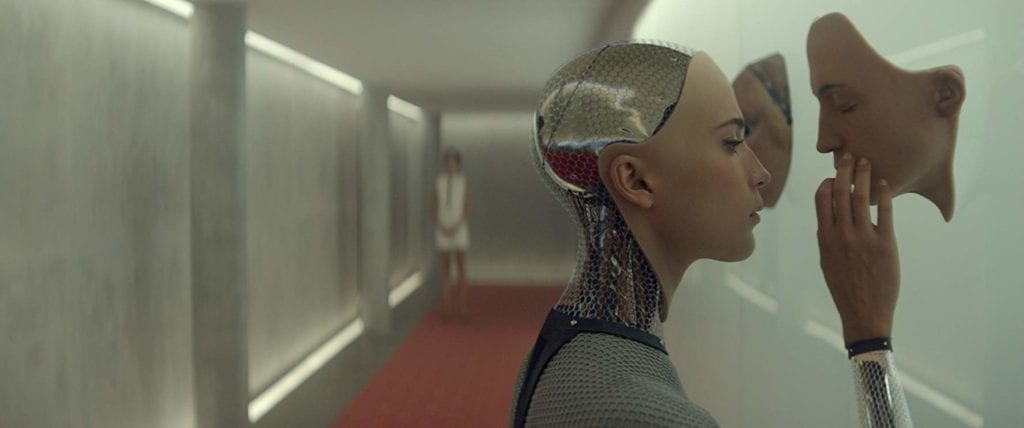
The pacing is slow and methodical, and the camerawork is eerie and invasive. Beautiful and sparse, the set design evokes a sense of loneliness, like a dystopian Apple store. The visual effects are haunting in their absolute seamlessness. And, of course, the performances from Alicia Vikander, Domhnhall Gleeson, and Oscar Isaac are likely to be among their career bests. Rarely does a debut film achieve this level of perfection in its execution. Ex Machina isn’t just a movie. It’s a statement of purpose.
Annihilation
In 2018, Alex Garland released his highly anticipated follow-up, Annihilation, loosely based on the Southern Reach trilogy by Jeff Vandermeer. This film was more challenging for audiences and critics, and many fans of the book found the adaptation alienating. After the initial release, Annihilation experienced a steep drop off in box office numbers, and it failed to make a profit.
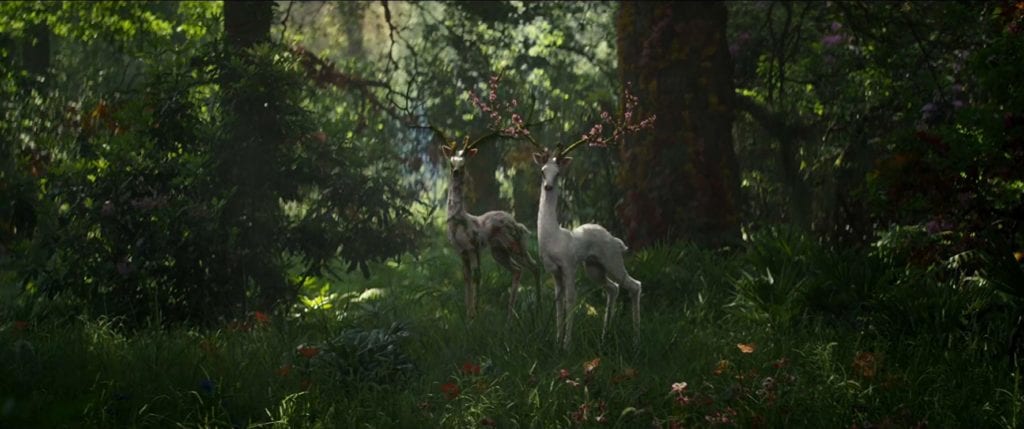
Though the film failed to find an audience in theaters, Annihilation is likely to gain a cult following in the years to come. On a technical level, the film is breathtaking, once again utilizing groundbreaking CGI to great effect. On first viewing, audiences are likely to feel confused and even disappointed by the strange, cerebral nature of the climax. However, a film like Annihilation thrives on repeat viewings, with the benefit of hindsight.
The dialogue plainly discusses the themes of identity and self-destruction. However, Garland’s enigmatic approach to the visual storytelling leaves the audience with more questions than answers. This makes it a great contender for post-screening discussions.
Devs
Alex Garland is currently working on a television show called Devs. The show will star Sonoya Mizuno as Lily Chan, a software engineer at a cutting-edge tech company, investigating her boyfriend’s mysterious death. Other than that, little is known about the plot, but it is likely to revolve around the dangerous implications of modern technology. In a 2018 interview with Fandango, Garland said:
“[Devs is] a sort of science fiction, but it’s a much more technology-based sci fi whereas Annihilation is a more hallucinogenic form of sci fi and more fantastical form of sci fi. This is slightly more in common with projects I’ve worked on like Ex Machina or Never Let Me Go, which are taking something about our world now — not our world in the future, but our world as it is right now — and then drawing sort of inferences and conclusions from it.”
Devs is set to release on FX in 2020.
Denis Villeneuve
Denis Villeneuve is a 51-year-old French Canadian filmmaker, known for his adaptability and fearlessness in choosing projects. He first made a splash in American cinema with his 2013 film Prisoners, a haunting thriller about child abduction that dives deep into themes of faith and morality. The same year, he released a complex exploration of Eternal Recurrence called Enemy.
Starring Jake Gyllenhaal in a dual performance, the film intentionally alienates its audience with tangential timelines and unexplained motifs. Enemy is disturbing and almost combative in its presentation, daring viewers to unravel its many mysteries. Unfortunately, it’s likely to be remembered as “that one movie with all the spiders.” Meanwhile, Villeneuve’s 2015 film Sicario hearkens back to his more practiced thriller roots, and it garnered both critical acclaim and reasonable commercial success.
Arrival
With his 2016 film Arrival, Villeneuve proved that he could capture the imagination of his audience. Moviegoers were entranced with the design of the aliens and their giant, obsidian egg of a ship. The film challenged the notion of faceless, hostile alien invaders, uninterested in exploring the well-tread tropes of movies like Independence Day and Signs. Instead, Arrival focuses on communication, centered on literary professor Louise Banks (played by Amy Adams) as she attempts to make meaningful contact with the alien beings, or heptapods.
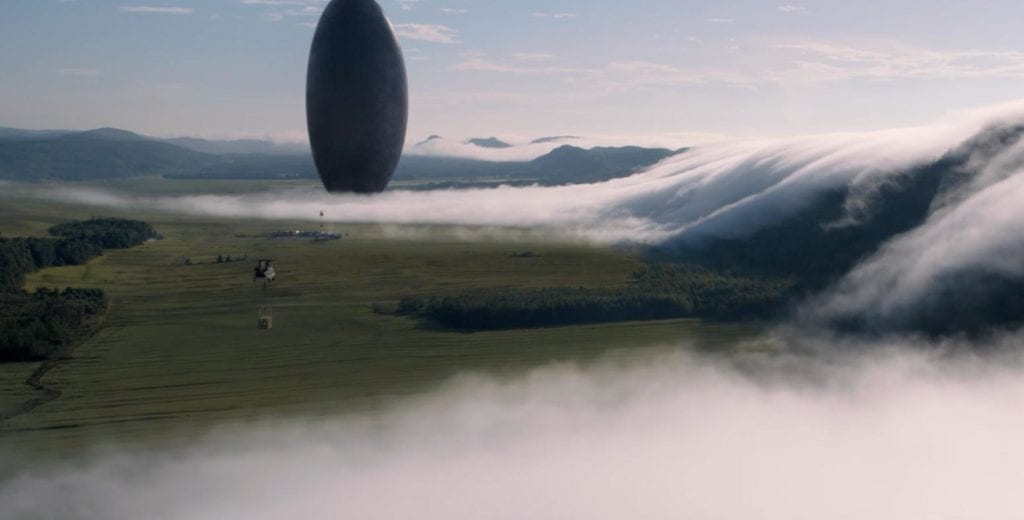
Arrival is masterfully constructed, playing with time in a way that is not only evocative, but thematically poignant. Following Louise on her emotional journey, Arrival first presents itself as a manifesto on grief. And yet, with the film’s final moments, it is impossible to feel anything but joy.
Blade Runner 2049
Blade Runner 2049 really put Villeneuve on the map, debuting number 1 at the box office on its opening weekend in October 2017. Many fans of the original Blade Runner were nervous about the long-awaited sequel, but most found it to be a respectful tribute to, and departure from, the original. Blade Runner 2049 stars Ryan Gosling as K, a Replicant Blade Runner. When K uncovers a dangerous secret, he finds himself in a race against time to track down Rick Deckard and expose the truth about Replicants.
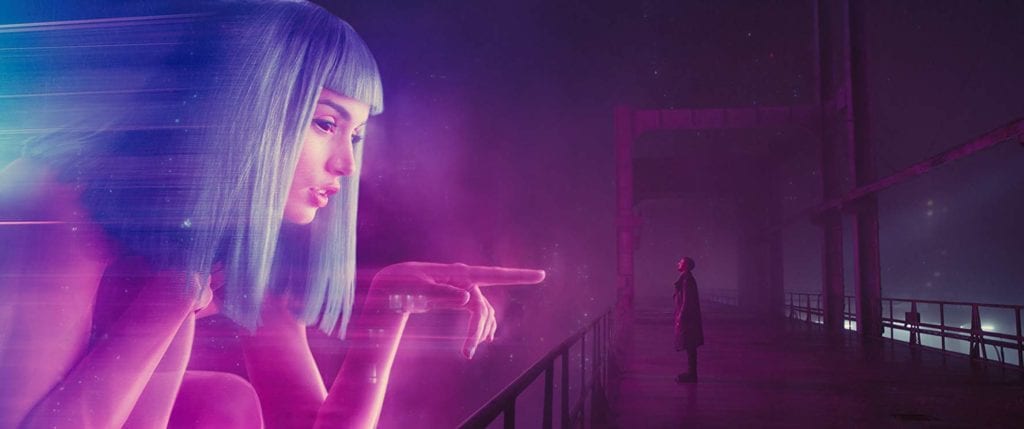
Blade Runner 2049 is a feast for the eyes. Though clearly inspired by Blade Runner, the sequel feels less like Ridley Scott and more like Stanley Kubrick. Veteran cinematographer Roger Deakins won a well-deserved Oscar for his work on this film. The camerawork inspires awe and wonder, basking in the lush electronic landscape of future LA, and then, in stark contrast, lingering on the negative space of the Las Vegas desert. Blade Runner 2049 is a true cinematic experience. Every single shot is a masterpiece. Though not as complex and evocative as the original, Blade Runner 2049 is a feat of filmmaking. Not a speck of dust is out of place. Blade Runner is a perfect story told simply. Blade Runner 2049 is a simple story told perfectly.
Unfortunately, Blade Runner 2049 didn’t benefit from word-of-mouth promotion, like Arrival did, and the film flopped with American audiences, failing to make back its $150 million budget. But with any luck, it will find an audience post-release. After all, the original Blade Runner wasn’t a hit either.
Dune
Next, Denis Villeneuve will tackle Frank Herbert’s classic, Dune. Of course, this is not the first attempt at a Dune adaptation. David Lynch’s infamous 1984 film failed to please fans, casual moviegoers, and critics alike. But it’s safe to assume, given Villeneuve’s maturity and skill, that the new adaptation will be competently made. Moreover, it could prove thought-provoking and visually spectacular.
Greig Fraser, the cinematographer for Rogue One and Zero Dark Thirty, has been tapped for the film, as well as a plethora of well-respected actors, including Timothée Chalamet, Josh Brolin, Stellan Skarsgård, Oscar Isaac, and Jason Momoa, to name a few. Villeneuve has proved, time and time again, that no project is too big, too intimidating, too difficult. If nothing else, Dune is sure to be an interesting experience.
Dune is set to release in November of 2020.
Final Thoughts
It’s easy to forget that movies are collaborative; the product of hundreds, sometimes thousands, of individual artists, working toward a shared vision. We tend to idolize directors, assigning them glory and blame, for entire projects. This is understandable. After all, directors are the visionaries. Their job is to make sure that everyone in the cast and crew shares the same vision.
Many filmgoers tend to view films through the lens of auteur theory. That is, they assign more value to films as an artist’s collection than as individual products. When discussing a controversial film like Once Upon a Time in Hollywood, it is easier to put the film in perspective when compared to Quentin Tarantino’s previous works. On the other hand, focus on the director as auteur can be limiting for the artist, and they may stagnate, or worse, rebel and fail spectacularly. Tim Burton wasn’t always a curator of muted colors and dismal whimsy. There was a time, early in his career, when moviegoers would say, “I like Tim Burton,” but they could not say, “I know what to expect from Tim Burton.”
Yorgos Lanthimos, Alex Garland, and Denis Villeneuve are seasoned veterans in the industry, but they’ve managed to evade the expectations that come with artist worship. Each of these directors bears the mark of a signature filmmaker, and yet their projects are not determined by the context of their previous work. They seem to understand that a body of work is an ongoing process, not a static object. As these directors continue to grow and evolve, I am certain that their work will continue to captivate audiences for years to come.



